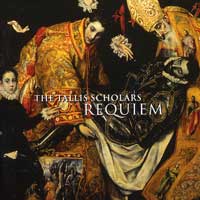Classical Music Review: The Rock Stars of Renaissance Vocal Music
The Tallis Scholars are a beloved Boston fixture thanks to their relationship with the Boston Early Music Festival, which will have them back on June 17th for their 22 annual appearance.
By Susan Miron
St. Paul’s Church in Cambridge has served many a vocal group well and did so again last Friday (April 1) when a packed church got to hear the famed The Tallis Scholars, dubbed by the New York Times as the rock stars of Renaissance vocal music.
The Scholars are a beloved Boston fixture thanks to their relationship with the Boston Early Music Festival, which will have them back in June 17th for their 22 annual appearance.
The Tallis Scholars were founded in 1973 by their dedicated director, Peter Phillips (whom we heard in the pre-concert talk), under whose inspired leadership they have made some 50 CDs and become stellar fixtures in the ever-burgeoning Early Music movement.
“From the start we have been a concert-giving secular organization,” Mr. Phillips explained to the Tallis Scholars’ uninitiated. Their diction and intonation are perfect. On Friday the sopranos soared, and when, at the ends of some movements, the low men’s voices were the last to be heard, they were profoundly stirring. The voices, five women’s and five men’s, blend perfectly, often sounding like a large chorus.
The Scholars’ program featured the great (his second) Requiem by Tomás Luis de Victoria (1548–1611) to commemorate the 400th anniversary of his death. Composed as part of a funeral service for the Empress Maria of Austria (1605) in whose chapel he served (she was Phillip II’s sister and Victoria’s patroness), the Requiem is Victoria’s best known work.
In addition to its liturgical movements, it contains a lesson from the Matins of the Dead (“My soul is weary of life”) and a funeral motet, Versa est in luctum. Many of its 10 movements sound and feel quite similar—quite slow, calm, with a hypnotic undertow, so that when a loud and passionate section like the Funeral motet with its text from Job comes along it’s quite a shock:
My harp is turned to mourning
and my organ into the voice of those that weep.
Spare me, O Lord, for my days are nothing.
With its gentle waves of peacefulness and passion, its chords wrapped around plainchant, the Requiem’s polyphony, created by a priest for a Roman Catholic Church, ultimately offers hope with its several mentions of light—lux perpetua. This is music that heals, that gives balm to one’s heart, that leaves a listener feeling spiritually elated.
The first half of the program was dedicated to forefathers, contemporaries, and followers of of Victoria during the Spanish Golden Age, including pieces by Francisco Guerrero, Juan Gutierrez de Padilla, Sebastián de Vivanco, and Alonso Lobo.
Here is how Guerrero explained his life’s endeavor as a composer: “not to caress the ears of pious persons with my songs, but . . . to excite their souls to devout contemplation of the sacred mysteries.” The evening program noted that “it is this refusal to caress, to soften the unyielding edges either of harmony or liturgy, that has come to characterize the music of the Spanish Golden Age” whose “tradition of spiritual intensity reached its craggy peak in the music of Victoria and his astonishing Requiem of 1605.”
I have heard the Requiem on CD (the Tallis Scholars 3-disc Victoria Collection) several times since last Friday, and it stays as moving and startling with each listening. This might be the music, but just as probably it is the voices of The Tallis Scholars and its director Peter Phillips. I understand now why, whatever they sing, there’s a full house.
Susan Miron, a harpist, has been a book reviewer for over 30 years for a large variety of literary publications and newspapers. Her fields of expertise were East and Central European, Irish, and Israeli literature. Susan covers classical music for The Arts Fuse and The Boston Musical Intelligencer.
Tagged: Renaissance, Tallis Scholars, The Boston Early Music Festival, Tomás Luis de Victoria


